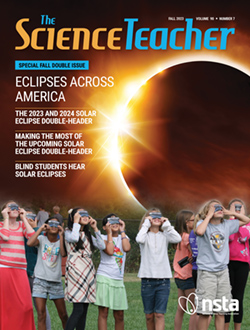The Science Teacher—Fall 2023

Fall 2023
Special Double Issue—Eclipses Across America
Journal Article
Preparing for the Great American Eclipse of 2024
The Great American Eclipse of 2017 path of totality passed across the United States on Monday August 21, 2017, from Madras, Oregon to Columbia, South Carolina (NASA 2017). The Great American Eclipse of 2024 will likewise pass across the United States...
By Kurtz Miller
Journal Article
Scientific Literacy: Lives could depend on it!
Carl Sagan famously said “We live in a society exquisitely dependent on science and technology, in which hardly anyone knows anything about science and technology” (Sagan, 1990, p. 264). As demonstrated during the COVID-19 pandemic, all adults ne...
By Charlotte Moser
Journal Article
Science concepts connect us to the wonders of the natural universe. Why is the sky blue? [Air molecules behave much like tiny little tuning forks.] Is there gravity in space? [Yes, it extends to infinity.] What do fish “breathe” underwater? [It�...
By John Suchocki
Journal Article
Teaching Students to Read Equations
The laws of nature are expressed in equation form in all physics courses. How these laws are taught can vary widely. In this article, I expand on previous Focus on Physics articles, particularly the March 2022 article “The Importance of Reading Equ...
By Paul G. Hewitt
Journal Article
Promoting Learning for All Through Explore-Before-Explain
The Next Generation Science Standards (NGSS) highlight the importance of creating more equitable learning environments and engaging all students in science (NGSS Lead States 2013). In professional learning, we target the hands-on, minds-on experience...
By Patrick Brown, Jay McTighe, and Rodger Bybee
Journal Article
Translanguaging as an Essential Practice in Socially Just Science Classrooms
In this interaction, Manuel and Rico (all names are pseudonyms) expertly mix Spanish and English to communicate as they collect data in a ninth grade physics lab. Your reaction to this mixture of English and Spanish, what users sometimes call “Span...
By Sarah Braden and Taylor Dexter
Journal Article
The 2023 and 2024 Solar Eclipse Double-Header
North America will experience a solar eclipse “double-header” this fall. While 500 million people will see two partial eclipses (when the Moon covers part of the Sun), those fortunate enough to be in a 125-mile-wide path on October 14, 2023, will...
By Dennis Schatz and Andrew Fraknoi
Journal Article
Making the Most of the Upcoming Solar Eclipse Double-Header
Eclipses of the Sun, where the Moon gets in front of the Sun and blocks its light, are among the most spectacular of natural events. The total eclipse visible in the United States in 2017 fascinated and involved millions of people all across the coun...
By Andrew Fraknoi and Dennis Schatz
Journal Article
Solar eclipses are excellent platforms for engaging students with astronomy and for teaching concepts like the Sun-Earth-Moon relationship through rare natural events. Traditional STEM instruction, however, highly depends on diagrammatic and visual m...
By Sóley Hyman, Wilson González-Espada, Allyson Bieryla, and Wanda Díaz-Merced
Journal Article
On Teaching Electricity Through History
Electricity is a fascinating phenomenon and one of the most important driving forces in the natural world, and our understanding of it all began with a fossilized lump of tree resin and a mystical rock from ancient Turkey. For the many years that I t...
By Christine Guy Schnittka
Journal Article
The Use of Storytelling to Model NGSS Science and Engineering Practices
An important strand of three-dimensional learning in the Next Generation Science Standards is science and engineering practices (SEPs; NGSS Lead States 2013). The SEPs also are one of four critical attributes of sensemaking (NSTA, n.d.). These practi...
By Adrienne Larocque and Anna Babarinde
Journal Article
Performance Assessment as Part of Efficient, Effective, and Equitable Instructional Practice
Since the release of the NGSS, science classrooms across the United States have shifted science learning away from a focus on decontextualized facts and concepts and toward engaging students in making sense of the world around them. Many educators ha...
By Lauren Stoll and Jill Wertheim
Journal Article
Classroom communities are more than just teachers and students. Administrators, other teachers and students, teacher aides, all school staff, families, friends, community leaders, and more influence a classroom community in different ways. Places and...
By Jonathan McCausland and Kathryn M. Bateman
Journal Article
For as long as people have had stories to tell, folklore and tall tales have been a part of social gatherings. Storytelling helps us convey our history and learn our languages (Bowman and Carpenter 2004; Mzimela 2016). In addition, many of these tale...
By Kimberly Ideus and Miles Engell
Journal Article
As long as there have been roofs overhead, there have been gardens above them. Since the Ziggurats and the Hanging Gardens of Babylon, man has cultivated plants for his enjoyment and nourishment. Fast forward 4,000 years to our increasingly urban wor...
By Andrew Jones, Joel Hockin,and Max Longhurst
Journal Article
Making Sense of the Deepwater Oil Spill Disaster
Authenticity in learning is becoming increasingly important as today’s students are not “buying into” school just because it’s there! Today’s high school students have learned firsthand (thanks to the COVID-19 pandemic) that science is not ...
By Joy Barnes-Johnson and Mridula Bajaj
Journal Article
Science Journaling with Technology
Students in today’s classrooms spend a lot of time using technology by listening to music, texting, watching videos, and using social media applications. Some theorize that student attention spans have lessened to a dismal amount due to the impact ...
By Brigitte Whaley and Ashley Campbell
Journal Article
Career of the Month: Acoustician
Acoustics involves all aspects of sound, noise, vibration, and perception. It’s a large field that encompasses specialties such as architecture, underwater, biomedical, ultrasonics, and speech. Acousticians can work for private industry (including ...
By Luba Vangelova
Journal Article
Does Drinking Milk Cause Strong Bones?
In 1935, individuals living in the United States began to encounter eye-catching posters communicating a variety of public program messages from the Works Progress Administration (WPA), established under President Franklin D. Roosevelt’s New Deal. ...
By Jacqueline Katz


